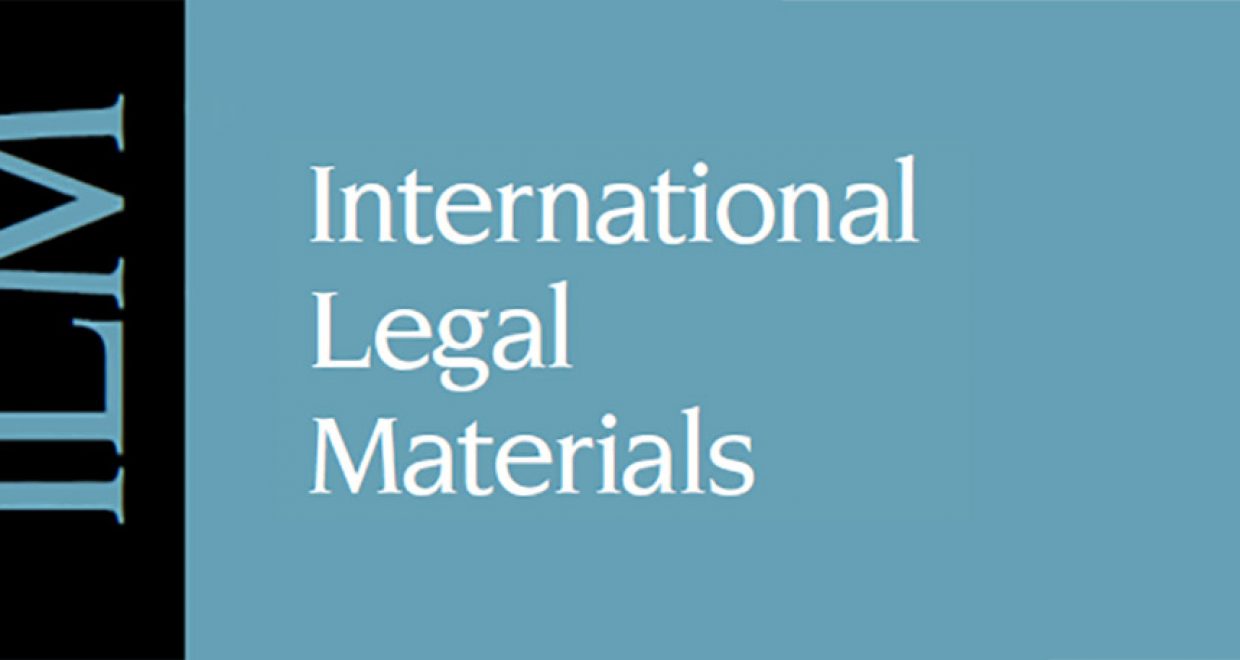Publishing for Posterity: The Daily Front Page and the ILM
A central point in every daily newspaper’s publishing cycle is the late afternoon meeting where, traditionally, editors sit around a table and decide which stories belong on the next day’s front page. What’s new and newsworthy? What reporting should readers be aware of, and what will appeal to a broad audience? What warrants prime real estate in a product sometimes called the “first draft of history”?
International Legal Materials, turning 60 this year, is no daily news rag. Published six times a year, ILM is first and foremost a curated collection of primary source documents, exclusively legal in nature. It caters to international law specialists, not general readers. And it’s safe to say no one has ever had to bellow “Stop the presses” for an issue of ILM.
There are, nevertheless, instructive similarities, or at any rate complementarities, between the process, product, and mission of daily newspapers and of ILM. ILM could never include all the international law that’s fit to print. But heading now toward its seventh decade, it maintains its vital role as a “paper of record” for key developments in the field.
The ILM Editorial Advisory Committee, which I have been honored to be a part of for the last four years, selects the primary content for each issue: the court decisions, resolutions, treaties, and other instruments that not only do or should “make news” in international law, but in most cases make international law itself. Whether convening around a Tillar House table or, of late, by Zoom, the Committee, supported by a roster of Corresponding Editors worldwide, has in mind much the same type of questions as the editors crafting a daily newspaper front page. More specifically, we consider the extent to which a document is of international significance versus merely regional or domestic; the subject matter and procedural posture of a case; whether a judicial opinion breaks new doctrinal ground or tackles a new or emerging topic; among other factors. Pieces with a certain importance that for one reason or another are not chosen to publish in full may still merit mention in the ILM’s Briefly Noted section.
It is worth pausing to emphasize a particularly vital form of diversity when it comes to document selection (and the document selectors): geography. The critical question posed by Anthea Roberts’ ASIL award-wining book of 2017 – Is International Law International? – offers an important backdrop to selection decisions. While an English-language publication of an American society, ILM is, rightly, increasingly attentive to including opinions and instruments that not only represent traditional organs and sources of international law, but that capture its development and articulation across the Americas, Africa, Asia, Europe, and the Middle East.
In today’s hyperlinked world, the published legal documents themselves are something of a commodity product. ILM’s principal value, therefore, lies in the curation, context, and continuity it provides (not to mention the one-stop-shop convenience). ASIL’s expert staff scour online sources globally and draw on member recommendations to prepare and summarize notable pieces for the editorial committee to consider. After selections are made, accompanying introductory notes are commissioned from subject-matter specialists to offer essential analysis, like the best newspapers do – not just what happened but why it matters. And with a track record of 60 years and the assurance of many more, ILM and its archives is an indispensable resource for current and future legal scholars and practitioners of all stripes.
Daily newspapers worldwide today face unremitting challenges. The one where I worked longest, the independent Moscow Times, was forced into exile in early March, like much of the free press that had still remained in Russia. But even as the news business continues to evolve, journalists will remain dedicated and instrumental in bringing facts to light – not least, when it comes to exposing international atrocities. And when, in due course, the mechanisms of international law call Vladimir Putin’s Russia to account for the horrific war against Ukraine, ILM will be proud to publish the verdicts of, and for, history.
In August 2022, ASIL is celebrating 60 years of International Legal Materials. This is the first in a series of blog posts about the anniversary. Visit the journal homepage here.
The writer is a member of the ILM Editorial Advisory Committee and an attorney-adviser at the U.S. Department of State and previously taught European Union law at Georgetown University Law Center. In the mid-1990s he was an editor at The Moscow Times newspaper. The views expressed are his own.






